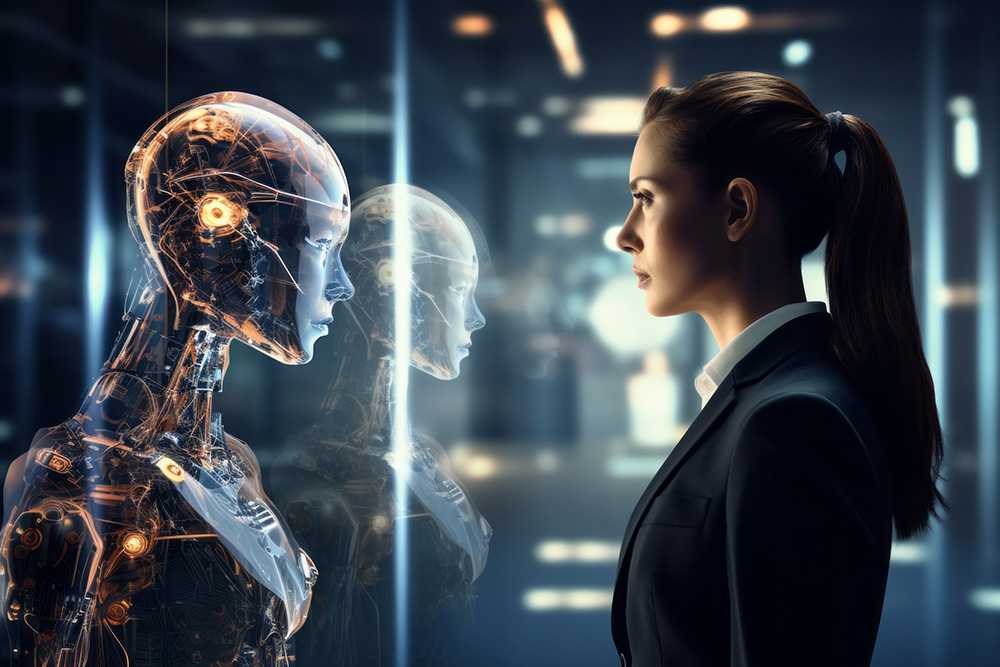The Collaborative Future of Marketing and AI
The future of marketing is here, and it’s powered by artificial intelligence (AI). But rather than replacing human marketers, AI is joining forces with us, enhancing our capabilities and value.
AI excels in areas like data analysis and task automation, handling the repetitive aspects of marketing with ease. However, it lacks the human touch—critical thinking, emotional intelligence, and the ability to forge genuine connections. These are the domains where human creativity thrives.

AI can’t replace the personal interactions that build lasting relationships. It’s the handshakes, the shared coffee meetings, and the personal stories that create real bonds with our audience.
Moreover, AI is still learning from our unique experiences and insights. Our originality leads to breakthrough ideas that AI alone cannot generate.
By embracing AI as a powerful tool and combining it with our human skills, we can take marketing to unprecedented heights. Together, we can unlock the full potential of our marketing prowess and chart a course for a future where technology and humanity work hand in hand.
The Human-AI Synergy in Marketing
The integration of AI in marketing is transforming the landscape, making it more efficient and data-driven. AI tools are now capable of analyzing customer behavior, predicting outcomes, automating marketing tasks, and creating personalized content. This allows marketers to focus on strategy and creative endeavors that require a human touch.
AI’s Role in Creative Processes
While AI can generate content, it still requires human guidance to ensure that the output aligns with brand values and resonates with the target audience. Marketers can use AI to optimize workflows collaboratively, shaping the AI’s generation behavior through feedback and reinforcement.
AI-driven tools can help in brainstorming sessions by providing a wide range of ideas based on data trends and consumer preferences. However, it is the human marketer who refines these ideas, adding a unique voice and perspective that aligns with the brand’s identity. For instance, AI can suggest topics for blog posts or social media content based on trending keywords, but it takes human insight to craft a compelling narrative that engages the audience.
Building Relationships with AI
AI may facilitate connections, but it’s the human element that solidifies them. Personal interactions, understanding customer needs, and providing empathetic responses are areas where humans excel. AI supports these efforts by providing insights and freeing up time for marketers to engage more deeply with their audience.
AI can analyze large volumes of data to identify patterns and trends, helping marketers understand their audience better. For example, AI can track customer behavior across multiple touchpoints, providing a comprehensive view of their preferences and needs. This information can be used to tailor marketing strategies, ensuring that each customer receives personalized and relevant content.
However, the final step in building a relationship always involves human interaction. Responding to customer inquiries, addressing concerns, and sharing personal stories are all crucial elements of relationship building that AI cannot replicate. Marketers can use the insights provided by AI to enhance these interactions, making them more meaningful and impactful.
Case Studies: Human-AI Collaboration in Action
Coca-Cola: Combining AI and Creativity
Coca-Cola has been at the forefront of leveraging AI to enhance its marketing efforts. The company uses AI to analyze vast amounts of data from social media, customer feedback, and market trends. This information helps Coca-Cola identify emerging trends and consumer preferences, enabling them to create highly targeted marketing campaigns.
One notable example is Coca-Cola’s use of AI to generate music tracks for their advertisements. By analyzing the type of music that resonates with different demographics, AI helps create tracks that appeal to a broad audience. However, the final selection and customization of these tracks are done by human marketers, ensuring that the music aligns with the brand’s identity and campaign objectives.
Sephora: Personalized Customer Experiences
Sephora, a leading beauty retailer, uses AI to provide personalized shopping experiences for its customers. The company’s AI-powered chatbot, Sephora Virtual Artist, allows customers to try on different makeup products virtually. The chatbot also provides personalized recommendations based on the customer’s preferences and previous purchases.
While AI handles the technical aspects of product recommendations and virtual try-ons, Sephora’s human beauty advisors play a crucial role in building relationships with customers. They provide expert advice, answer questions, and offer personalized tips, creating a seamless blend of technology and human touch.

The Ethical Considerations of AI in Marketing
As AI becomes more integrated into marketing strategies, it’s important to consider the ethical implications of its use. Issues such as data privacy, algorithmic bias, and transparency must be addressed to ensure that AI is used responsibly.
Data Privacy
AI relies on vast amounts of data to function effectively. Marketers must ensure that they collect and use data ethically, respecting customer privacy and adhering to data protection regulations. Transparency is key; customers should be informed about how their data is being used and given the option to opt out if they choose.
Algorithmic Bias
AI algorithms can sometimes perpetuate existing biases, leading to unfair or discriminatory outcomes. Marketers must be vigilant in identifying and addressing any biases in their AI systems. This involves regularly auditing algorithms, using diverse datasets, and implementing measures to mitigate bias.
Transparency
Customers have a right to know when they are interacting with AI. Marketers should be transparent about the use of AI in their campaigns, ensuring that customers understand how AI is being used to enhance their experiences. This builds trust and fosters a positive relationship between the brand and its audience.
The Future of Human-AI Collaboration in Marketing
The future of marketing is not AI alone but a harmonious blend of technology and human ingenuity. As AI continues to evolve, its role in marketing will become even more significant. However, the human element will always be essential in creating authentic, engaging, and meaningful marketing experiences.
By embracing AI as a powerful tool and combining it with our human skills, we can take marketing to unprecedented heights. Together, we can unlock the full potential of our marketing prowess and chart a course for a future where technology and humanity work hand in hand.
AI is not here to usurp the role of marketers but to complement it. As we navigate the evolving world of marketing, AI serves as a powerful ally, enhancing our capabilities and enabling us to reach new creative heights. By leveraging AI’s strengths in data analysis and automation, marketers can focus on the strategic and creative aspects of their work, creating campaigns that resonate deeply with their audience.
The integration of AI in marketing is a partnership that elevates human creativity, enabling us to achieve more than we ever could on our own. By embracing this partnership, we can create a future where technology and humanity work together to deliver exceptional marketing experiences."
Recent Blogs
Marketing says traffic is up. Ads are getting clicks. Campaigns report “good engagement”. Sales says the pipeline still feels light. If that sounds familiar, your…
Read MoreA CFO types “IT support for manufacturers Toronto” into Google. At the top of the page, they see two competitors. One is running a paid…
Read MoreMost attribution debates pretend to be about science. They’re about credibility. Sales wants proof that marketing’s dollars create pipeline. Marketing wants recognition that discovery takes…
Read MoreMarketing says traffic is up. Ads are getting clicks. Campaigns report “good engagement”. Sales says the pipeline still feels light. If that sounds familiar, your…
Read MoreA CFO types “IT support for manufacturers Toronto” into Google. At the top of the page, they see two competitors. One is running a paid…
Read MoreMost attribution debates pretend to be about science. They’re about credibility. Sales wants proof that marketing’s dollars create pipeline. Marketing wants recognition that discovery takes…
Read More


